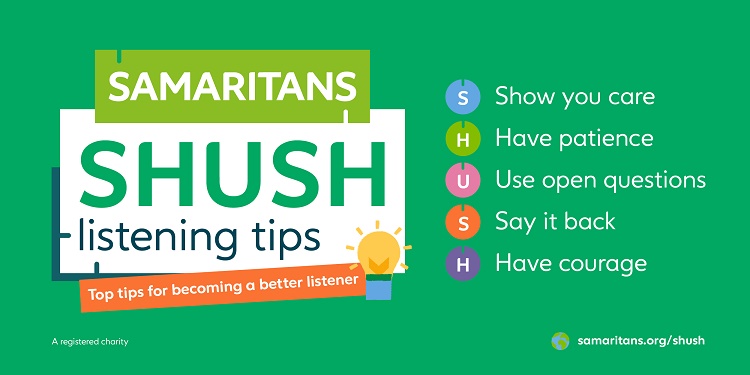Looking after mental health: tips from Samaritans
Last updated 20th June 2024 by the SunLife Content Team
5 min read
With so much going on in our lives and the wider world today, it's important to check in with ourselves and our loved ones.
We spoke to Sophie, a listening volunteer from Samaritans. She tells us how we can look out for each other, spot signs that someone might be struggling, and all learn to be better listeners.
Hi Sophie, thanks so much for taking the time to chat to us. Tell us a bit about yourself and what you do.
I'm one of 22,000 volunteers at Samaritans, the charity that is there to listen for anyone struggling to cope, 24 hours a day.
Samaritans has over 200 branches across the UK and Ireland. We are there to listen by phone, email, letter, and online chat.

How many calls and messages do you receive, and what are the most common reasons people get in touch?
Believe it or not, Samaritans actually receives a call for help every 10 seconds. So, over the last year, our volunteers have spent around a million hours listening to people struggling to cope.
People contact Samaritans for all sorts of different reasons, but the most common are loneliness and isolation, mental health or illness, family, relationship problems and physical illness.
What some people don't realise though is that Samaritans is not only for the moment of crisis. They're taking action to prevent the crisis by giving people ways to cope and the skills to be there for others.
Samaritans offers listening and support to people and communities in times of need. In prisons, schools, hospitals and on the rail network, they are working with people who are going through a difficult time and training others to do the same.
That's incredible. I think sometimes we don't realise how many of us need support because we don't talk about it. Why do you think there's such a taboo about admitting you need help or are lonely?
Mental health can be a very lonely illness. From personal experience, it makes you feel like a burden on people, so you keep it to yourself and withdraw from the people around you.
I guess that's where Samaritans is such a lifesaving tool – to have an anonymous voice at the end of the phone who won't judge or try and fix you makes such a positive difference.
I think there is also still a bit of stigma around it just being the 'older generation' who struggle with loneliness. But from talking to people during and after Covid, it's been eye-opening to see the amount of people who have felt lonely and disconnected from the world around them. Reaching out for support and checking in with loved ones might not change the world, but it can change the world of that one person.
What can people do if they're experiencing loneliness themselves?
Well, firstly I'd say just remember that anyone can face difficult times, and it's a sign of great strength to reach out for support. If you don't feel comfortable speaking to a friend or family member then Samaritans are always here to talk, 24/7, whatever the reason for calling.
We also have some useful tips on our website for things you can do to support your own mental wellbeing if you're struggling.
What about feeling lonely when you're already surrounded by people a lot of the time?
Absolutely, being lonely isn't just about spending time alone. You can be in a room filled with people and still have that aching feeling of loneliness. It's very much about having that connection with people. And if you are in a headspace where that feels impossible, it can leave you struggling to maintain relationships.
At Samaritans we'd always encourage you to speak to someone about how you're feeling, whether that's a friend, family member, GP or Samaritans.
Sometimes it might be hard to recognise in yourself that you need some extra support. How can we spot signs that we might need to practice some self-care?
Anyone can struggle to cope. Some signs you can look out for might be feeling tired more than usual, struggling to focus on things, and not enjoying activities that you normally would. But it might just be a sense of not feeling quite right, and that's enough of a reason to reach out and talk to someone.
How about spotting signs that a friend might be struggling?
Everyone copes and reacts in their own way, but there are some general signs to look out for such as being more tired than usual or not wanting to do the things they usually enjoy – the Samaritans website has some useful advice for spotting these signs.
It's good to just check in regularly with anyone you're worried about, especially if you think they could be going through a difficult time.
If we do spot these signs in a friend, how can we best support them?
Reaching out to someone could help them know that someone cares and help them access the support they need.
Once someone starts to share how they're feeling it's important to listen. This could mean not offering solutions or advice.
Since being a listening volunteer, it has given me that extra opportunity to connect with people. It's a privilege to listen to callers and share moments with them when they need someone to listen. From being both sides of the phone, I know how important it is, in someone's hour of need and when they need someone to turn to. Thankfully, Samaritans are there around the clock.
Thanks so much Sophie, that sounds like great advice. One final question to sum up then – how can we all be better listeners?
At Samaritans, we've developed some listening tips we call SHUSH:
- S is for Showing you care. It means being fully engaged with no phones or distractions. Try to really focus on learning about the person speaking and avoid talking about yourself.
- H is for Having patience. It's not always easy to open up when we're struggling, so you may have to wait until the person is ready to address certain issues. I find it helpful to allow pauses in conversations rather than trying to fill them – sometimes it provides the useful thinking space needed.
- U is for Using open questions. That means ones which you can't just answer 'yes' or 'no' to. So instead of saying “Do you feel upset about it?” you could ask “How do you feel about it?” to help the person share more in their answer.
- S number two is Saying it back. Just repeating things back is a simple way to make someone feel like you've listened and understood what they're saying. And it gives them a chance to reflect further on what they've said.
- H is Having courage. This means not being put off by a negative response, and not being afraid of silences in the conversation. Sometimes it might feel awkward to ask people how they're really feeling, but if they've been wanting to talk about it, they will be relieved that you asked.

Remember, Samaritans is always there to listen. You can call free on 116 123 or email jo@samaritans.org for support 24/7.
Here are some useful links to further advice from Samaritans on supporting a loved one:
Related articles
The thoughts and opinions expressed in the page are those of the authors, intended to be informative, and do not necessarily reflect the official policy or position of SunLife. See our Terms of Use for more info.
